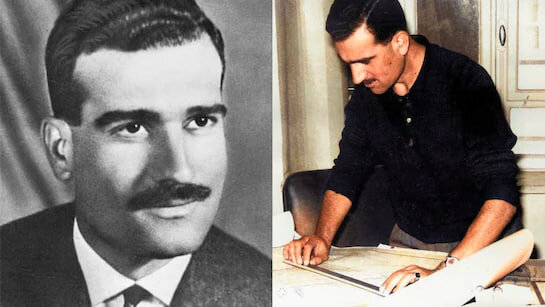BEIRUT – On the 60th anniversary of his execution, Israeli Prime Minister Benjamin Netanyahu showed his achievement in retrieving 2,500 documents from Mossad Agent Eli Cohen to an enemy who is mercilessly trying to defeat the government for Gaza’s failure.
Netanyahu argued that his forces “achieved the secret and complex operations carried out in collaboration with partners in the strategic intelligence agency, during which the official Syrian archives related to Eli Cohen were moved to “Israel.”
Cohen had entered Syria under the name Kamel Amin Tavet, claiming to be a member of a Syrian family that had immigrated to Latin America.
Golan Heights was a closed military zone at the time, but Cohen was permitted to enter at least three times, with the approval of the then Syrian Chief of Staff.
After the war in June 1967, Israeli Prime Minister Levi Esicol is quoted as saying, “If it wasn’t for the information provided by Cohen, the Army would have had to recruit more brigades to fight at the height of Goran.”
Cohen expanded his ties with high-ranking government officials before he was discovered and executed in Marge Square, central Damascus, on May 18, 1965.
According to INEWS 24, a private meeting attended by Netanyahu and Mossad chief David Balnea, documents containing the original, which Koen wrote several hours before his execution, were reviewed.
The Hebrew channel added that the archive transfer came after decades of effort by Mossad Intelligence, Operations and Technology personnel, in collaboration with partners in intelligence reporting agencies and security communities across Israel and around the world.
The documents include a forged passport, documents used by Cohen, and numerous telegrams he received from the Mossad, including orders to monitor the Syrian military base in Queneitra.
An informed Syrian source explained that the documents were kept in archives at the national security headquarters of the former Syrian regime.
The headquarters, like other security and intelligence news headquarters, was not attacked on the first day of Damascus’ collapse.
This is especially true under the de facto ruler of Syria, Arjurani (Ahmed Alshara).
Strategic analysts have linked Mossad’s acquisition of Coen Archives to ongoing consultations between Tel Aviv and Damascus in several respects.
In this context, Channel 12 revealed that Major General Oddbassiok, the director of the Israeli Attack Forces, recently met with representatives of the new Syrian government in Azerbaijan.
According to Harletz, the channel confirmed that other meetings are being held in the UAE to sign Qatar-mediated normalization agreements.
Soon after the collapse of Damascus, Israeli enemies began an investigation to find Cohen, and the remains of one of three soldiers who went missing at the Battle of Sultan Jacob in Becavalley, Lebanon, during the 1982 invasion revealed that Russia had crossed over to Israeli enemies.
Sources further revealed that Israel’s enemies are also interested in confiscating collections of ancient Torah scrolls and other Syrian artifacts.
In April 2015, Walla revealed that in January 1962, Cohen had sailed from Italy to Beirut, where he had taken him to Syria and met a CIA agent named Majdi Sheikh Al-ard, who had taken him to Syria, where he had taken him to Syria, where he had rented a house on the other side of Syrian General Staff Headquarters.
Cohen was born in December 1924 to a Jewish family who emigrated from Aleppo to Egypt from Aleppo to Aleksandria, where he worked for the Zionist movement.
In 1957, Cohen settled in the occupied Palestinian territory, where he was recruited by the Caesaria Special Forces and received intensive training.
In 1961 he was sent to Argentina with a French passport, where he enacted the identity of a Syrian businessman about to return to his homeland, strengthening his ties with the Syrian community.
In September 2023, Yedioth Ahronoth published a report entitled “Mossad Children Talking About Life Under Lies.”
But Cohen’s daughter Sophie doesn’t necessarily do that, claiming that she “paid a heavy psychological and material price.”
The son of Israeli spy Shramit Kish Cohen also participates in the documentary, where he talks about his mother’s psychological tragedy after returning to occupied Palestinian territory.
From the late 1940s to the early 1960s, Schlamit Kissic Cohen formed extensive relationships with Lebanese and Arab politicians. She founded an arts and music salon in Beirut, recruited prostitutes and extracted important secrets from guests for Hagana. She also gathered information on training for the Palestinian revolutionaries in Lebanon.
After her cover was revealed, Shura Cohen was sentenced to death, and later commutes to prison for 20 years, and was released as part of a prisoner exchange following the war in June 1967, where she was warmly greeted and became a Mossad legend.
A few years ago, Libyan newspapers revealed the arrest of a Mossad agent named Benjamin Ephraim. Benjamin Ephraim infiltrated Libya’s mosque called Abu Hafs, pretending to be an Imam. According to Spanish newspaper El Pais, he led more than 200 ISIS members to commit acts of violence and terrorism.
Observers questioned Arjurani’s true identity and whether he was the creation of the Mossad, recalling how Israeli hospitals treated terrorists during the war with Syria over the past decade. Despite his claims to be from Syrian origin, nothing is known about his past or origin.
In any case, it is not likely that we are waiting and learning lessons from the serious mistakes we have made in our malicious unning enemies that are trying to weaken, divide and fragment us.

